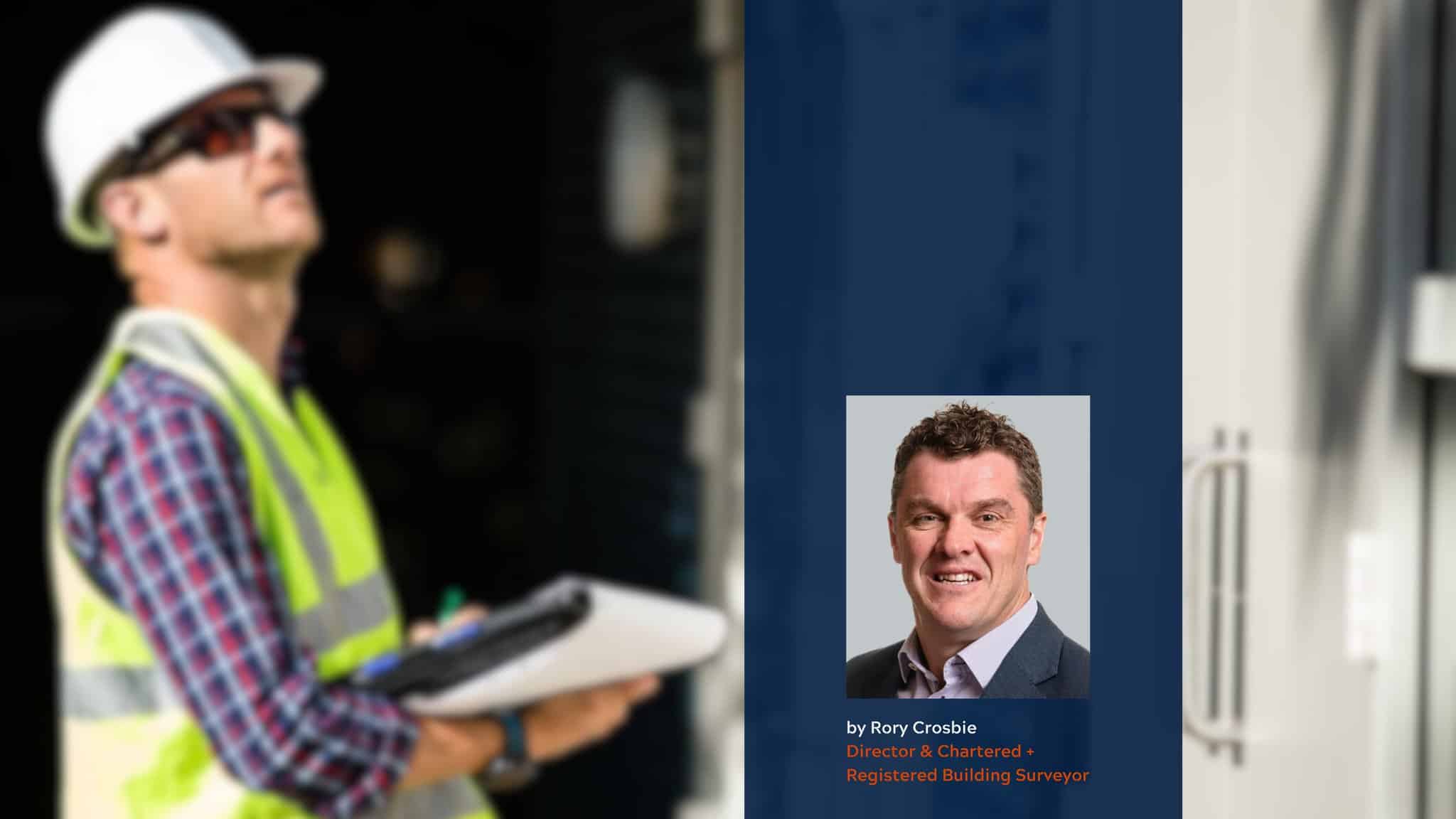In a perfect world, we’d have perfect buildings. They’d be built without defects, and wouldn’t be subject to the ongoing deteriorative effects of day-to-day use, weather and environmental conditions, or isolated events like fire, flood and earthquake.
But in the real world, buildings can have a multitude of issues. Construction defects may have been there since it was built, or faults and flaws could have developed during its lifetime. Some issues can lead to bigger problems further down the track – think cladding systems that don’t keep the water out, which can mean annoying leaks now, but over time could result in serious decay of the building’s fabric.
While we don’t live in a perfect world, we do have Building Surveyors. It’s their job to assess a building’s condition, the integrity of the building fabric, and the compliance of various building systems. A Building Surveyor can provide expert advice on the design, construction and performance of building elements over their intended life. They can also offer recommendations on repairs or alterations to remediate or improve a building.
Who does a Building Surveyor work for?
Building Surveyors typically act for property owners, investors, landlords and tenants – those who own, use or have an interest in any built asset. Building Surveyors offer insight at every stage of the building lifecycle – from planning and design, through construction and commissioning, to sale and purchase, lease start and end, repair, alteration and repurposing, even demolition and rebuilding.
A Building Surveyor understands the operational, maintenance and capital demands of a building, which can vary with its intended use. They can advise what’s required to maintain a building’s operational functionality and asset value. When things go wrong, they can also collect forensic evidence and act as expert witness in disputes and legal proceedings.
Chartered and Registered Building Surveyors – what’s the difference?
Both Chartered and Registered Building Surveyors have demonstrated the required technical and ethical standards to achieve their professional accreditation, which is your assurance you are dealing with a genuine professional.
In New Zealand, a Registered Building Surveyor has achieved their professional accreditation through the New Zealand Institute of Building Surveyors (NZIBS), while a Chartered Building Surveyor is accredited by the Royal Institution for Chartered Surveyors (RICS), which is based in the UK but globally recognised.
The many different types of building survey
A Building Surveyor can carry out a variety of different surveys, depending on the needs and priorities of their client. Understanding what information is of value, to whom, and at what point in the building lifecycle, is part of a good Building Surveyor’s remit.
Building surveys can be classified into categories, depending on their intended use. These include:
Condition surveys:
There are many situations when it’s critical to understand the condition of a building, or its elements and systems. This is where condition surveys are used, to determine the current condition, and often the future maintenance needs of a building and its various elements.
Condition surveys can include:
- Building Condition Surveys – these assess a whole building’s condition, or the condition of specific building elements like a roof. They are often used for maintenance planning, leading on to a Planned Preventative Maintenance (PPM) schedule, or a Long Term Maintenance Plan (LTMP) in the case of body corporate managed properties.
- Stock Condition Surveys – assess several properties within a portfolio, usually for the purposes of Strategic Asset Management, enabling the client to make informed decisions about their assets.
- Premises Condition Reports – often appended to a lease agreement at commencement, these reports assess and document the condition of the property at the start of the tenancy.
- Pre- and Post-Development (also called Dilapidation) surveys – often used by developers to document the condition of properties adjacent to a major development, to ensure any resulting damage can be properly compensated, and reduce the risk of claims for pre-existing damage.
Transactional surveys:
When a building changes hands, usually by sale or lease, the parties can include this type of survey as part of their due diligence. This ensures they are entering into the contract with their eyes fully open.
Transactional surveys include:
- Technical Due Diligence (TDD) surveys – usually requested by the potential buyer of a property to highlight any potential risks and opportunities with the acquisition. When prepared on behalf of the vendor, they are often referred to as Vendor Surveys.
- Premises Condition Reports – as above, these are used to document the condition of a commercial premises at the start of a lease.
- Lease Reinstatement surveys – at lease termination, the landlord or tenant may request a lease reinstatement survey to assess and quantify the ‘make good’ provisions in the lease agreement.
Forensic or investigative surveys:
When there is a known issue with a building, investigative surveys can be used to determine the nature, extent and cause of the problem. They are often used in cases of construction defects, weathertightness issues, and insurance investigations following an insured event.
Forensic and investigative surveys can include:
- Building Defect Analysis – these tend to focus on a particular defective part of a building. Initial investigative surveys are typically non-invasive, and are then followed up if necessary with more detailed, diagnostic surveys. Diagnostic surveys are typically ‘destructive’ surveys that involve sampling and testing, and are often used to provide forensic evidence for use in resolving disputes.
- Weathertightness Surveys – a specific type of defect analysis survey focused on weathertightness or ‘leaky building’ issues.
- Insurance Investigation – carried out on behalf of the insured, loss adjuster or insurance company, these focus mainly on clarifying where damage was caused by the insured event, and where it was pre-existing.
- Forensic Investigation – used to investigate a specific defect to support a legal claim or dispute, and can lead on to the Building Surveyor acting as an Expert Witness in court.
Specialist technical advice
Building Surveyors, depending on their areas of expertise and experience, can also offer a wide range of expert technical advice at various stages of the building life cycle. This includes:
Expert witness – in disputes involving property or construction, Building Surveyors with the right experience can be called upon to present forensic evidence and provide independent, expert testimony to assist with legal proceedings.
Design peer review – reviewing designs to ensure they will meet the client’s needs, for example in terms of suitability, buildability, feasibility or compliance with building codes or other criteria.
Weathertightness – providing specialised advice on best practice weathertight design and construction, including facade peer review and weathertightness testing.
Building Sustainability and ESG advice – some Building Surveyors offer specialised building sustainability assessments, and advice on improvements that could be made to meet ESG targets.
Project management – many Building Surveyors are also experienced in project management, and can act in various roles to ensure a successful outcome to a construction or remediation project. This can include technical roles such as Engineer to Contract, Contract Administrator or Independent Certifier, and could involve site observation, project monitoring and auditing.
Above all, a good Building Surveyor will work closely with their client to establish exactly what information they need, and where they can add the most value.
At Prendos, adding value to your assets is our number one priority. If you’d like to speak with our Building Surveyors about how they can help you maximise the value of your investments, call us on 0800 PRENDOS, email prendos@prendos.co.nz, or fill in the form below and we’ll call you back.


